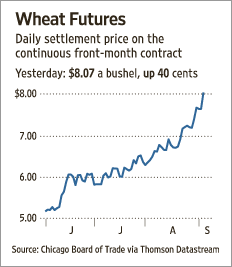forum
library
tutorial
contact

Wheat's Surge to Pinch Wallets
by Tom PolansekWall Street Journal, September 5, 2007
|
the film forum library tutorial contact |

|
Wheat's Surge to Pinch Walletsby Tom PolansekWall Street Journal, September 5, 2007 |
Food Prices Face Increasing Pressure as Futures Hit High
 CHICAGO -- Consumers in the coming months will have to pony up a little more money at the grocery store for flour, bread and other baked goods as record wheat futures prices are driving up food costs, analysts said.
CHICAGO -- Consumers in the coming months will have to pony up a little more money at the grocery store for flour, bread and other baked goods as record wheat futures prices are driving up food costs, analysts said.
Wheat futures have soared this summer amid serious crop losses in key growing areas of the Northern Hemisphere, including Europe and the Black Sea region. Dryness in Australia also threatens to slash production Down Under for the second year in a row.
Trader anxiety over shrinking world supplies lifted nearby-month Chicago Board of Trade wheat futures to a record of $8.10 per bushel, exceeding the previous high of $8.05 set Friday. The contract settled at $8.07, up 40 cents. A year ago, it traded at $4.04.
Consumers don't typically feel the impact of fluctuations in wheat futures on their pocketbooks because the grain only makes up a small amount of the total cost of a food product. Other costs, including packaging and marketing, account for much more of the final sticker price.
However, the sharp rise in wheat futures in recent weeks is out of the ordinary and the increase will trickle down to consumers, analysts said.
"The increase in wheat prices is not insignificant whatsoever," said Michael Swanson, an agricultural economist with Wells-Fargo.
Prices for products that most resemble the raw commodity, such as flour, will increase the most and the fastest, Mr. Swanson said. Highly branded and "differentiated" products, such as Wheat Thins snack crackers, should see slower and more modest increases because they have more profit-margin already built in.
It may be a year or more before rising commodity prices translate into steeper prices for the highly differentiated products, but prices for undifferentiated products can increase almost immediately, Mr. Swanson said.
"There's no way [millers] can keep flour at the same price if they had to pay 2.5 times as much for wheat," Mr. Swanson said.
Still, the amount of wheat used in many baked goods remains relatively small, said Pat Westhoff, an economist at the Food and Agricultural Policy Research Institute at the University of Missouri-Columbia. Therefore, consumers shouldn't expect to pay twice as much for bread and crackers at the checkout because futures are double what they were a year ago.
Erica Peterson, a marketing specialist at the North Dakota Wheat Commission, agreed it was important to remember that wheat makes up "a very small percentage" of many products.
"Obviously since prices have gone quite a bit higher in the last year, that's probably going to have somewhat of an effect on the final price" of food products, Ms. Peterson said. "I think we'll see a small increase."
In some wheat-based cereals, for example, wheat is responsible for less than 4% of the total manufacturing cost, one analyst said.
U.S. wheat futures rallied this summer as the global production problems left the U.S. as the primary source for high-quality milling wheat. The London-based International Grains Council recently pegged 2007-08 ending stocks -- what's left over after accounting for supply and demand -- at their lowest since 1979-1980.
In other commodity markets:
COPPER: Futures declined as U.S. economic data gave traders a bearish outlook for demand for the metal, analysts said. September copper contract fell 8.85 cents to settle at $3.3225 a pound on the Comex division of the New York Mercantile Exchange.
CRUDE OIL: Futures rose to a one-month high on refinery glitches, renewed predictions of an active tail end to the Atlantic hurricane season and expectations for declines in petroleum stockpiles in U.S. data this week. Light, sweet crude oil for October delivery settled $1.04, or 1.4%, higher at $75.08 a barrel on the New York Mercantile Exchange.
learn more on topics covered in the film
see the video
read the script
learn the songs
discussion forum
